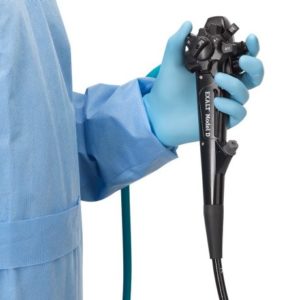
2. Boston Scientific: Exalt Model D disposable endoscope
The FDA in December 2019 cleared the first fully disposable duodenoscope — the Exalt Model D made by Boston Scientific (NYSE:BSX). It received CE mark approval in early 2020.
“From a regulatory and payer perspective, we have seen a steady drumbeat of positive momentum since FDA clearance. Exalt Model D received CE Mark in Europe in January 2020. In the U.S., in June 2020, CMS also approved our application for a transitional pass-through (TPT) payment — a new payment category — for single-use endoscopes, including Exalt Model D, in outpatient settings,” David Pierce, EVP and president of MedSurg and president of endoscopy at Boston Sci, told Medical Tubing + Extrusion.
“Securing this TPT was an important milestone as it increased healthcare providers’ access to the device for Medicare beneficiaries, particularly during a time of heightened awareness of the need to eliminate infection risk,” Pierce said.
Boston Sci designed the Exalt Model D single-Use duodenoscope for use in endoscopic retrograde cholangiopancreatography procedures. At the time of FDA clearance, it was the first single-use duodenoscope on the market and was granted breakthrough device designation.
The Marlborough, Mass.–based company’s duodenoscope has four-way bending capabilities at the distal tip with a range of motion similar to reusable duodenoscopes. Its elevator is designed to deliver consistent performance while facilitating guidewire locking at the distal tip of the duodenoscope. It can be used with the Exalt Controller and is compatible with Boston Scientific’s single-use endoscope accessories.
“We have and are continuing to invest voluntarily in clinical research by coordinating prospective clinical trials to drive further published evidence related to clinical use and performance of Exalt Model D,” Pierce said. “We also continue to innovate based on feedback from our customers to ensure that our scopes remain state of the art.”
“From an environmental standpoint, we’ve partnered with industry leaders in medical recycling and waste management to offer sustainability solutions, including full device recycling or waste to energy. This may reduce waste deposited to landfills, lower greenhouse gas emissions, and destroy potential contaminants through incineration,” Pierce said. “We’re also in the pilot phase of a ‘recycle by mail’ program for the device, with approximately 20% of customers currently using the service. We’re assessing logistics, customer feedback, pricing and other factors for a full launch.”
Next >>